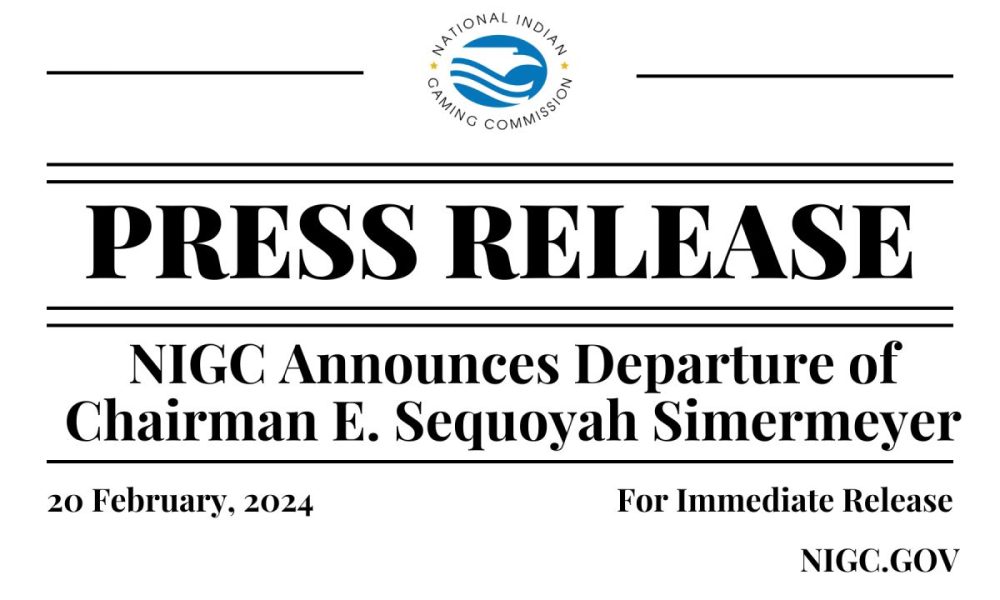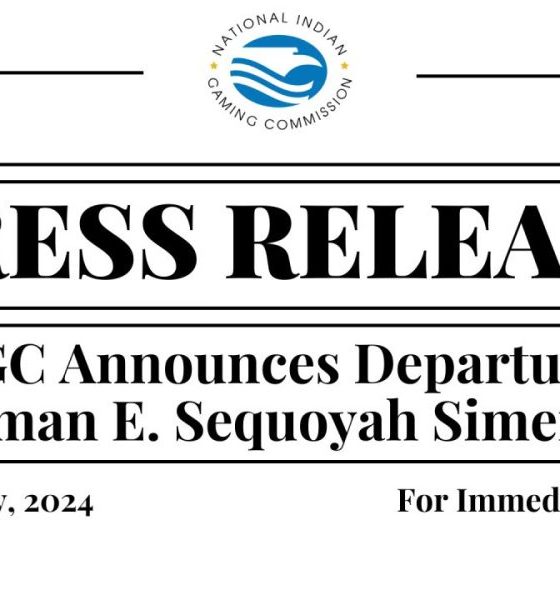

Compliance Updates
NIGC Announces Departure of Chairman E. Sequoyah Simermeyer
The National Indian Gaming Commission (NIGC) announced the resignation of E. Sequoyah Simermeyer, as the chairman of NIGC, effective Saturday, Feb. 24, 2024.
Simermeyer, confirmed by the U.S. Senate in November 2019, led the Agency through unprecedented challenges of a global pandemic. During this time, the Agency helped set the regulatory conditions for a multi-year, post-pandemic recovery, where Indian gaming gross revenues rose to a record $40.9B last year. Prior to his tenure as chairman, Simermeyer served with NIGC as associate commissioner and director of the Office of Self-Regulation since 2015.
Reflecting on his time at the Agency, Simermeyer said, “I’ve witnessed firsthand how tribes across the Indian gaming industry have pursued economic sustainability through gaming by relying on – and cultivating – the robust regulatory reputation for which Indian gaming is well known, and made better when supported by effective and efficient measures by Indian gaming’s regulators. I’m proud of the integral part this Agency has played in meeting the challenges of an evolving industry, and encouraged that NIGC’s strong cadre of professionals will continue to work hand-in-hand with gaming operations to ensure tribal gaming remains primarily for the benefit of its citizens as the Indian Gaming Regulatory Act (IGRA) mandated 35 years ago.”
From day one, Simermeyer established industry integrity, preparedness, outreach, and Agency accountability as strategic goals for the Agency, leading NIGC through a period of growth and expansion of programs and services available to gaming tribes.
Under Simermeyer’s leadership, the Agency took steps to grow its capacity to provide outreach, training and technical assistance to gaming tribes, notably formalizing its Environmental Public Health and Safely (EPHS) program to assist tribes with overall operational preparedness, and expanding the Agency’s ability to provide cybersecurity technical assistance as the industry faced emerging threats from cybercrimes, including NIGC’s first Chief Information Security Officer. His “3 for 35” campaign for workforce preparedness, aimed at building regulatory capacity to future-proof tribal gaming, was also an Agency signature outreach effort during his tenure.
NIGC’s efficient and effective approach to regulation was driven by its formalized, collaborative tribal consultation process, where over the past three years, the Agency published eight final rules to keep pace with changing regulatory conditions and industry best practices, while allowing tribes the maximum flexibility allowed under IGRA to pursue efficiencies intended to help operations grow and thrive. To further strengthen its compliance and oversight functions, the Agency also rolled out the “Report a Violation” tool on its website to allow for reporting suspected IGRA violations. NIGC also provided important clarity in the wake of industry-wide questions arising from emerging topics such as significant court decisions on sports betting, the impact of cannabis on licensing and the use of gaming revenue, and the independence of tribal gaming regulatory bodies.
Simermeyer also positioned the Agency as a lead collaborator with federal agencies and organizations similarly dedicated to the success of tribal gaming. NIGC’s annual multiagency Cybersecurity Symposium, Anti-Money Laundering/Banking Security Act (Title 31) regulatory training conference and ongoing partnership with the Department of Homeland Security’s Blue Campaign to prevent human trafficking, are all examples. He also led the Agency to pursue memoranda of understanding with federal agencies like the Federal Reserve Bank of Minneapolis, to promote a shared interest in researching the impacts of lending to tribes engaged in gaming and facilitating tribal access to capital.
Focusing on Agency operations, Simermeyer led the Agency through a multi-year IT security modernization plan to improve NIGC’s internal cybersecurity and resilience. Additionally, he transformed the Agency’s Criminal Justice Information System (CJIS) Audit program to better align with FBI requirements. As another step towards transparency and accountability, the Agency reimagined its fiscal annual report to better tell the story of its commitment to preserve and protect Indian gaming under IGRA, and the stories of the employees behind it. Perhaps most important, under Simermeyer’s leadership, the Agency achieved a 91% employee satisfaction rating on the 2023 Federal Employee Viewpoint Survey (FEVS), making the NIGC one of the best places to work in the federal government.
On transitioning to the next stage of his career, Simermeyer is grateful for his nearly nine years with the Agency. “My time with NIGC has been some of the most memorable and impactful years of my career. As a Native person, I’m truly blessed to have been surrounded by experts dedicated to protecting and preserving the valuable resource Indian gaming represents for our communities. I’m thankful for the advice and counsel of my fellow commissioners and NIGC staff, and the support and hard work of the nearly 5,000 tribal regulators who work alongside NIGC day-in and day-out to keep Indian gaming strong now, and for the next 35 years,” said Simermeyer.
Additional details regarding the transition will be forthcoming.
BetAlert
Brazilian Institute of Responsible Gaming Launches BetAlert

The Brazilian Institute of Responsible Gaming (IBJR), an entity that brings together the main operators in Brazil and worldwide, announces the launch of BetAlert, an unprecedented tool that allows any user to quickly and easily verify whether the betting site they intend to use is regulated by the Federal Government. The initiative is part of the “No More Elephant in the Room” campaign, which includes a TV commercial, radio spots, airport panels, and social media actions. Its goal is to guide bettors in choosing platforms regulated by the Secretariat of Prizes and Betting, under the Ministry of Finance.
Conducted between April and May 2025 with 2000 adult bettors, research by the Locomotiva Institute served as the basis for the economic study prepared by LCA. The survey estimates that between 41% and 51% of the Brazilian betting market still operates illegally. The activity of these irregular platforms reflects an alarming fiscal impact: between R$ 1.8 billion and R$ 2.7 billion went uncollected in just three months – which could reach R$ 10.8 billion in one year.
Named BetAlert (https://betalert.com.br/), the technology runs on an exclusive microsite that offers an interactive experience for those looking to bet safely and obtain tips on how to differentiate regulated betting sites from illegal ones. Simply enter the URL of any betting site, and the tool immediately indicates whether the platform is licensed. If it is regulated, the following message appears: “All good. This betting site is authorized by the Federal Government.” If not, the system displays a creative alert integrated into the campaign by agency We: “Attention. This betting site is not authorized by the Federal Government,” reinforcing the illegality of the platform consulted.
“IBJR greatly values the use of tools and technologies that contribute to spreading knowledge about the sector. BetAlert is extremely important, and we hope it will be widely used by bettors and Brazilian society. Our goal is to ensure that people have access to all the benefits of regulation, the core of which is the safety of those who bet,” said Fernando Vieira, Executive President of IBJR.
The post Brazilian Institute of Responsible Gaming Launches BetAlert appeared first on Gaming and Gambling Industry in the Americas.
Compliance Updates
German Betting Association Warns of Rise of Black Market Gambling

Only one in twelve German betting websites is legal, warns the German Sports Betting Association (DSWV) at the start of the UEFA Champions League season: there are at least 382 illegal German-language websites offering sports betting compared to just 34 legal betting sites. The DSWV refers to a corresponding evaluation by the Joint Gambling Authority of the federal states (GGL) for the year 2024.
“Online, it’s 11:1 in favor of the black market and that puts players at risk. In the legal sports betting market, players benefit from guaranteed player protection, reliable payouts and tax revenue for the common good. Illegal providers in the black market, on the other hand, do not adhere to any rules, offer no security and have a higher risk of gambling addiction,” Mathias Dahms, President of the German Sports Betting Association (DSWV), said.
With the start of the UEFA Champions League, the second most-bet competition in Germany after the Bundesliga, the volume of betting has skyrocketed.
“Players need to be particularly vigilant at this time of year so that they don’t accidentally end up with illegal providers. This is another reason why it is important that the legal providers are present with perimeter boards and TV advertising during the Champions League matches,” Dahms said.
What many players do not know is that they are not only taking a higher risk, but are also liable to prosecution. Participating in unauthorized sports betting can result in a prison sentence of up to six months or a fine.
How to recognise legal betting providers:
• Only legal providers may advertise on stadium boards and on television during sporting events such as the Champions League or Bundesliga.
• Only providers on the GGL whitelist are legal in Germany. The list is publicly available at www.gluecksspiel-behoerde.de/whitelist.
• Legal providers have a clearly visible GGL permit logo on their website.
• Only legal providers offer comprehensive player protection measures such as deposit limits, player bans and monitoring of conspicuous gaming behavior.
• Only legal providers contribute to the funding of support services for gamblers at risk of gambling addiction, such as the anonymous and free hotline 0800-1372700 or the website check-dein-spiel.de of the Federal Institute of Public Health (BIÖG).
• With legal providers, payouts are guaranteed and the stakes are properly taxed.
“It is in the common interest of regulators, providers and players to strengthen the legal market and push back the black market. This is the only way to ensure player protection, integrity and tax revenues,” Dahms said.
The post German Betting Association Warns of Rise of Black Market Gambling appeared first on European Gaming Industry News.
Compliance Updates
Ukraine’s PlayCity Begins Issuing Licenses to Gambling Operators

The Cabinet of Ministers of Ukraine has adopted a resolution on licensing conditions in the gambling sector, which allows the state agency PlayCity to begin issuing licenses to gambling organisers and confirming previously issued ones.
“As a result, this will generate almost UAH 50 million (1.028.956,00 Euro) in additional revenues to the state budget from license fees in the near future,” PlayCity reported on Telegram.
It is noted that to obtain a license, impeccable business reputation, lack of ties with the aggressor state and implementation of all necessary mechanisms for responsible gaming are required.
PlayCity clarified that such requirements apply to both those who are only applying for a license and current licensees. Current licensees have two months to submit documents to PlayCity on compliance with the requirements.
The message emphasises that if the requirements are not met, sanctions in the form of fines or termination of the license may be applied to the organisers of gambling.
“The state will direct additional budget revenues to strengthen defense capabilities, in particular, to purchase drones for the Defense Forces,” PlayCity added.
The post Ukraine’s PlayCity Begins Issuing Licenses to Gambling Operators appeared first on European Gaming Industry News.
-

 gaming3 years ago
gaming3 years agoODIN by 4Players: Immersive, state-of-the-art in-game audio launches into the next generation of gaming
-
EEG iGaming Directory9 years ago
iSoftBet continues to grow with new release Forest Mania
-
News8 years ago
Softbroke collaborates with Asia Live Tech for the expansion of the service line in the igaming market
-
News7 years ago
Super Bowl LIII: NFL Fans Can Bet on the #1 Sportsbook Review Site Betting-Super-Bowl.com, Providing Free Unbiased and Trusted News, Picks and Predictions
-
iGaming Industry8 years ago
Rick Meitzler appointed to the Indian Gaming Magazine Advisory Board for 2018
-
News7 years ago
REVEALED: Top eSports players set to earn $3.2 million in 2019
-
iGaming Industry8 years ago
French Senator raises Loot Boxes to France’s Gambling Regulator
-
News7 years ago
Exclusive Interview with Miklos Handa (Founder of the email marketing solutions, “MailMike.net”), speaker at Vienna International Gaming Expo 2018

















